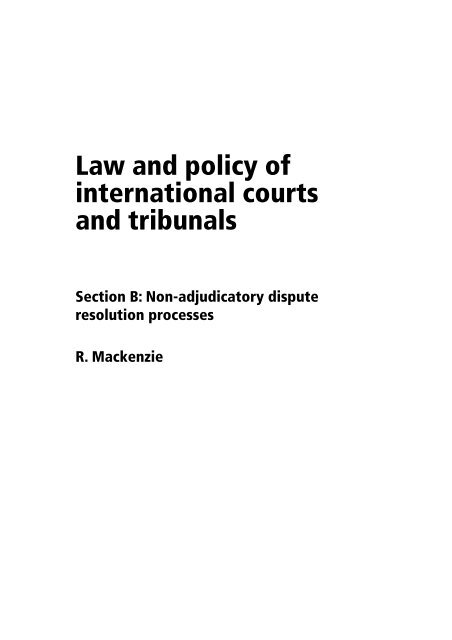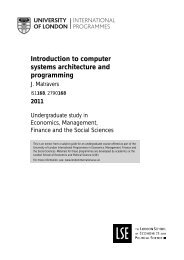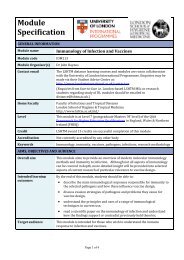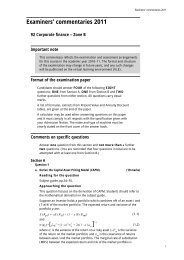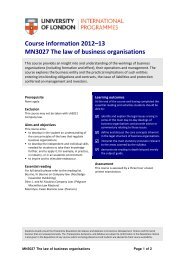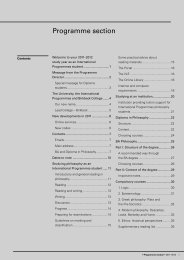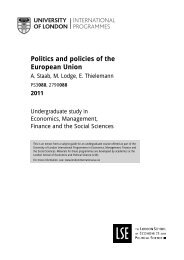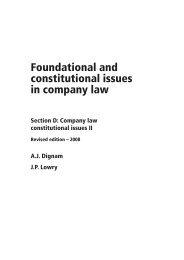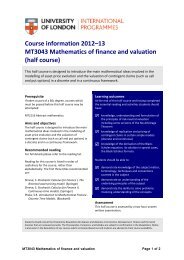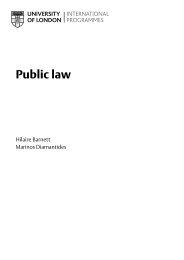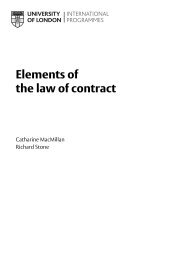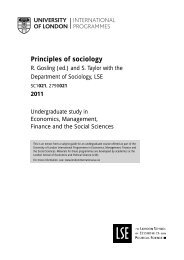Law and policy of international courts and tribunals - University of ...
Law and policy of international courts and tribunals - University of ...
Law and policy of international courts and tribunals - University of ...
You also want an ePaper? Increase the reach of your titles
YUMPU automatically turns print PDFs into web optimized ePapers that Google loves.
<strong>Law</strong> <strong>and</strong> <strong>policy</strong> <strong>of</strong><br />
<strong>international</strong> <strong>courts</strong><br />
<strong>and</strong> <strong>tribunals</strong><br />
Section B: Non-adjudicatory dispute<br />
resolution processes<br />
R. Mackenzie
This study guide was prepared for the <strong>University</strong> <strong>of</strong> London by: Ruth Mackenzie, Principal<br />
Research Fellow <strong>and</strong> Assistant Director <strong>of</strong> the Centre for International Courts <strong>and</strong> Tribunals,<br />
Faculty <strong>of</strong> <strong>Law</strong>s, <strong>University</strong> College London.<br />
This study guide was prepared by Ruth Mackenzie, with comments <strong>and</strong> suggestions from<br />
Pr<strong>of</strong>essor Philippe S<strong>and</strong>s QC, Pr<strong>of</strong>essor Christine Chinkin, Dr. Cesare Romano <strong>and</strong> Ivana<br />
Radacic. It is based on a course outline originally designed by Pr<strong>of</strong>essor Philippe S<strong>and</strong>s QC<br />
<strong>and</strong> Pr<strong>of</strong>essor Christine Chinkin.<br />
This is one <strong>of</strong> a series <strong>of</strong> study guides published by the <strong>University</strong>. We regret that the<br />
author is unable to enter into any correspondence relating to, or arising from, the guide.<br />
If you have any comments on this study guide, favourable or unfavourable, please use the<br />
form at the back <strong>of</strong> this guide.<br />
Publications Office<br />
The External Programme<br />
<strong>University</strong> <strong>of</strong> London<br />
Stewart House<br />
32 Russell Square<br />
London WC1B 5DN<br />
United Kingdom<br />
www.londonexternal.ac.uk<br />
Published by the <strong>University</strong> <strong>of</strong> London Press<br />
© <strong>University</strong> <strong>of</strong> London 2005<br />
Printed by Central Printing Service, <strong>University</strong> <strong>of</strong> London<br />
All rights reserved. No part <strong>of</strong> this work may be reproduced in any form, or by any means,<br />
without permission in writing from the publisher.
Contents<br />
Introduction 1<br />
Chapter 1 Inter-state arbitration 3<br />
1.1 Introduction to <strong>international</strong> arbitration 4<br />
1.2 Ad hoc arbitration 5<br />
1.3 Permanent Court <strong>of</strong> Arbitration 6<br />
1.4 Arbitration provisions in multilateral treaties 7<br />
1.5 Arbitration <strong>and</strong> judicial settlement distinguished 12<br />
Chapter 2 Mixed <strong>international</strong> arbitration 17<br />
2.1 International Centre for Settlement <strong>of</strong> Investment Disputes 18<br />
2.2 International commercial arbitration 23<br />
2.3 Iran-US Claims Tribunal 24<br />
Chapter 3 Diplomatic means <strong>of</strong> dispute settlement 29<br />
3.1 Introduction to diplomatic means <strong>of</strong> dispute resolution 30<br />
3.2 Negotiation 31<br />
3.3 Mediation <strong>and</strong> good <strong>of</strong>fices 36<br />
3.4 Fact-finding <strong>and</strong> inquiry 38<br />
3.5 Conciliation 40<br />
3.6 The choice <strong>of</strong> dispute resolution process 43<br />
Chapter 4 Compliance mechanisms in multilateral<br />
environmental agreements 47<br />
4.1 The nature <strong>of</strong> compliance mechanisms 48<br />
4.2 How are compliance mechanisms established? 51<br />
4.3 Features <strong>of</strong> compliance mechanisms 51<br />
4.4 What are key elements <strong>of</strong> a compliance mechanism <strong>and</strong><br />
what are the critical issues to be resolved in relation to<br />
each <strong>of</strong> basic elements? 52<br />
4.5 What is the relationship between compliance procedures<br />
<strong>and</strong> other means <strong>of</strong> dispute settlement provided in the treaty? 57<br />
Contents<br />
iii
<strong>Law</strong> <strong>and</strong> <strong>policy</strong> <strong>of</strong> <strong>international</strong> <strong>courts</strong> <strong>and</strong> <strong>tribunals</strong>: Section B<br />
iv<br />
Chapter 5 Inspection mechanisms in <strong>international</strong> development<br />
banks 61<br />
5.1 Key issues 62<br />
5.2 World Bank Inspection Panel 63<br />
5.3 Inspection procedures in other development banks 66<br />
5.4 The evolution <strong>of</strong> the inspection function 70<br />
5.5 Key features <strong>of</strong> inspection mechanisms 72
Chapter 3: Diplomatic means <strong>of</strong> dispute<br />
settlement<br />
Introduction<br />
This chapter addresses various processes for the resolution <strong>of</strong><br />
<strong>international</strong> disputes. The processes surveyed in this chapter have<br />
in common that they do not, as a general rule, result in a legally<br />
binding outcome (although the parties to the dispute may<br />
themselves subsequently decide to embody the resolution <strong>of</strong> the<br />
dispute in a legally binding instrument).<br />
Article 33 <strong>of</strong> the UN Charter sets out the main mechanisms for<br />
the peaceful settlement <strong>of</strong> <strong>international</strong> disputes. It provides:<br />
‘The parties to any dispute, the continuance <strong>of</strong> which is likely<br />
to endanger the maintenance <strong>of</strong> <strong>international</strong> peace <strong>and</strong><br />
security, shall, first <strong>of</strong> all, seek a solution by negotiation,<br />
enquiry, mediation, conciliation, arbitration, judicial<br />
settlement, resort to regional agencies or arrangements, or<br />
other peaceful means <strong>of</strong> their own choice.’<br />
The means enumerated in Article 33 are generally characterised as<br />
diplomatic (or non-adjudicatory) <strong>and</strong> legal (or adjudicatory)<br />
means:<br />
Diplomatic means include negotiation, consultation,<br />
mediation, conciliation <strong>and</strong> inquiry. Under these means, the<br />
parties to the dispute retain control <strong>of</strong> the outcome <strong>of</strong> the dispute in<br />
that they remain free to accept or reject any proposal for resolution.<br />
In contrast to these mechanisms, legal (or adjudicatory) means <strong>of</strong><br />
dispute settlement (arbitration <strong>and</strong> judicial settlement) result in<br />
third party decisions that are binding upon the parties to the<br />
dispute.<br />
This chapter focuses on identifying the characteristics <strong>of</strong> the various<br />
diplomatic means <strong>of</strong> dispute settlement, <strong>and</strong> the principal<br />
distinctions between them. As will become apparent, the means <strong>of</strong><br />
dispute settlement considered in this chapter are not always clear<br />
cut alternatives – the distinctions between them may be rather<br />
blurred <strong>and</strong> to a large extent the different processes represent a<br />
continuum <strong>of</strong> dispute settlement options.<br />
Learning outcomes<br />
By the end <strong>of</strong> this chapter <strong>and</strong> the relevant readings you should be able to:<br />
identify <strong>and</strong> explain the various diplomatic means available for the resolution<br />
<strong>of</strong> <strong>international</strong> disputes<br />
explain the principal features <strong>of</strong> <strong>and</strong> distinctions between the various means<br />
29
<strong>Law</strong> <strong>and</strong> <strong>policy</strong> <strong>of</strong> <strong>international</strong> <strong>courts</strong> <strong>and</strong> <strong>tribunals</strong>: Section B<br />
30<br />
assess why states, or others involved in <strong>international</strong> disputes, might prefer<br />
particular means <strong>of</strong> dispute resolution<br />
discuss aspects <strong>of</strong> the relationship between adjudicatory <strong>and</strong> nonadjudicatory<br />
means <strong>of</strong> dispute resolution.<br />
Essential reading<br />
Merrills, Chapters 1–4.<br />
Collier, J. <strong>and</strong> V. Lowe The Settlement <strong>of</strong> Disputes in International <strong>Law</strong>.<br />
(Oxford: Oxford <strong>University</strong> Press, 1999), Chapter 2.<br />
Anderson, D. ‘Negotiation <strong>and</strong> Dispute Settlement’ in Evans, M. (ed.)<br />
Remedies in International <strong>Law</strong>: The Institutional Dilemma. (Oxford: Hart<br />
Publishing, 1998).<br />
Franck, T.M. ‘Administrative Impartiality as Fairness: the UN Secretary-<br />
General’s Good Offices <strong>and</strong> other ‘Third Party’ Functions’ in Franck, T.M.<br />
(ed.) Fairness in International <strong>Law</strong> <strong>and</strong> Institutions. (Oxford: Clarendon Press,<br />
1995).<br />
US Diplomatic <strong>and</strong> Consular Staff in Tehran (United States v Iran) 1980 ICJ<br />
Rep., paras 1–31, <strong>and</strong> 39–45, available at http://www.icj-cij.org.<br />
Case Concerning Gabcikovo-Nagymaros project, (Hungary/Slovakia) 1997<br />
ICJ Rep, para. 125 ff, available at http://www.icj-cij.org.<br />
Case Concerning L<strong>and</strong> <strong>and</strong> Maritime Boundary between Cameroon <strong>and</strong><br />
Nigeria, 1998 ICJ Rep. para. 56, available at http://www.icj-cij.org.<br />
Hague Convention for the Pacific Settlement <strong>of</strong> International Disputes 1899<br />
– available at www.pca-cpa.org/ENGLISH/BD/#Conventions.<br />
Hague Convention for the Pacific Settlement <strong>of</strong> International Disputes 1907<br />
– available at www.pca-cpa.org/ENGLISH/BD/#Conventions.<br />
Useful further reading<br />
An Agenda for Peace, Preventive Diplomacy, Peacemaking <strong>and</strong> Peacekeeping,<br />
Report <strong>of</strong> the Secretary-General pursuant to the statement adopted<br />
by the Summit Meeting <strong>of</strong> the Security Council on 31 January 1992, UN Doc.<br />
A/47/277 (1995), paras 25, 37, available at http://www.un.org/Docs<br />
/SG/agpeace.html.<br />
Manila Declaration on the Peaceful Settlement <strong>of</strong> Disputes, UN General<br />
Assembly Resolution 37/10 (1982), available at<br />
http://www.un.org/documents/ga/res/37/a37r010.htm.<br />
3.1 Introduction to diplomatic means <strong>of</strong> dispute<br />
resolution<br />
See Collier <strong>and</strong> Lowe, Readings, at pp.19–20. The UN Charter, in<br />
Article 2, imposes an obligation on members to refrain from the<br />
threat or use <strong>of</strong> force <strong>and</strong> to settle <strong>international</strong> disputes by<br />
peaceful means. Article 33(1) <strong>of</strong> the UN Charter sets out the<br />
main mechanisms for the peaceful settlement <strong>of</strong> <strong>international</strong><br />
disputes. It provides:
‘The parties to any dispute, the continuance <strong>of</strong> which is likely<br />
to endanger the maintenance <strong>of</strong> <strong>international</strong> peace <strong>and</strong><br />
security, shall, first <strong>of</strong> all, seek a solution by negotiation,<br />
inquiry, mediation, conciliation, arbitration, judicial<br />
settlement, resort to regional agencies or arrangements, or<br />
other peaceful means <strong>of</strong> their own choice.’<br />
Collier <strong>and</strong> Lowe note that ‘[t]here is in one sense a progression<br />
evident in that list as it moves from negotiation to the International<br />
Court. The processes tend to become more formal. The extent to<br />
which third parties are involved in settling the dispute between the<br />
parties increases.’ (Collier <strong>and</strong> Lowe, The Settlement <strong>of</strong> Disputes in<br />
International <strong>Law</strong>, p.7) However, they proceed to note that ‘the<br />
tendency to think <strong>of</strong> the various settlement procedures as a<br />
pyramid up which states climb, from the base <strong>of</strong> negotiations to the<br />
apex <strong>of</strong> the ICJ, is quite wrong’ (Collier <strong>and</strong> Lowe, p.8). 1<br />
The various mechanisms <strong>and</strong> processes referred to in Article 33(1)<br />
<strong>of</strong> the UN Charter, <strong>and</strong> explored in this chapter, are alternatives –<br />
they may be selected <strong>and</strong> used separately or, on occasion, in<br />
combination, with a view to finding a resolution to the dispute.<br />
Bear in mind that because <strong>of</strong> the consensual nature <strong>of</strong> <strong>international</strong><br />
adjudication <strong>and</strong> arbitration (see Section A, Chapters 1–5 <strong>and</strong><br />
Section B, Chapter 4), the diplomatic means <strong>of</strong> dispute settlement<br />
do not generally operate under the ‘shadow <strong>of</strong> law’ as Chinkin puts<br />
it, in contrast to alternative dispute resolution (ADR) mechanisms<br />
such as mediation at the domestic level (see Chinkin in the<br />
Essential reading for Chapter 4, pp.126–127). In many instances<br />
the diplomatic means <strong>of</strong> dispute settlement may be the only means<br />
available to settle the dispute because procedural impediments bar<br />
recourse to adjudication. They may also provide the means through<br />
which parties to a dispute can eventually agree to submit the<br />
dispute, or aspects <strong>of</strong> it, to a court or tribunal for a binding<br />
decision.<br />
3.2 Negotiation<br />
Essential reading<br />
Merrills, Chapter 1.<br />
Anderson, D. ‘Negotiation <strong>and</strong> Dispute Settlement’ in Evans (ed.) Remedies in<br />
International <strong>Law</strong>: The Institutional Dilemma. (Oxford: Hart Publishing, 1998).<br />
US Diplomatic <strong>and</strong> Consular Staff in Tehran (United States v Iran) 1980 ICJ<br />
Rep., paras 1–31, <strong>and</strong> 39–45, available at http://www.icj-cij.org.<br />
Case Concerning Gabcikovo-Nagymaros project, (Hungary/Slovakia) 1997<br />
ICJ Rep, para. 125 ff, available at http://www.icj-cij.org.<br />
Case Concerning L<strong>and</strong> <strong>and</strong> Maritime Boundary between Cameroon <strong>and</strong><br />
Nigeria, 1998 ICJ Rep. para. 56, available at http://www.icj-cij.org.<br />
Negotiation remains the principal, <strong>and</strong> most flexible, means <strong>of</strong><br />
settling <strong>international</strong> disputes, <strong>and</strong> plays an important role in the<br />
prevention <strong>and</strong> management <strong>of</strong> <strong>international</strong> disputes, as well as in<br />
Chapter 3: Diplomatic means <strong>of</strong> dispute settlement<br />
1 See readings for Section A, Chapter 1.<br />
31
<strong>Law</strong> <strong>and</strong> <strong>policy</strong> <strong>of</strong> <strong>international</strong> <strong>courts</strong> <strong>and</strong> <strong>tribunals</strong>: Section B<br />
their resolution. Treaties frequently refer to negotiation as the<br />
principal means <strong>of</strong> attempting to settle a dispute. For example, as<br />
noted in Chapter 1, Article 27 <strong>of</strong> the Convention on Biological<br />
Diversity provides that disputes between parties as to the<br />
interpretation or application <strong>of</strong> the Convention should be settled by<br />
negotiation, <strong>and</strong> that if agreement cannot be reached by<br />
negotiation the parties to the dispute may have resort to other<br />
peaceful means. Article 283 <strong>of</strong> the UN Convention on the <strong>Law</strong> <strong>of</strong><br />
the Sea (UNCLOS) provides that the parties to a dispute arising<br />
under UNCLOS should proceed expeditiously to an exchange <strong>of</strong><br />
views regarding settlement by negotiation or other peaceful means.<br />
The means through which negotiations are conducted are at the<br />
discretion <strong>of</strong> the parties to the dispute. They generally take place<br />
through diplomatic channels, but may also be conducted in the<br />
context <strong>of</strong> intergovernmental organisations or through specially<br />
convened summit meetings.<br />
Negotiations are not always directed at full settlement <strong>of</strong> every<br />
aspect <strong>of</strong> the dispute. They may be directed at different goals, for<br />
example:<br />
32<br />
the avoidance <strong>of</strong> a dispute (through prior consultations <strong>and</strong><br />
agreement)<br />
the management <strong>of</strong> an existing dispute (for example,<br />
negotiations to agree on an appropriate dispute settlement<br />
mechanism, or to define the parameters <strong>of</strong> the dispute)<br />
the implementation <strong>of</strong> a judgment or award.<br />
These possibilities are considered further below.<br />
3.2.1 Dispute avoidance<br />
Prior consultation <strong>and</strong> negotiation on an ad hoc or institutionalised<br />
basis can play an important role in preventing potential disputes.<br />
For example, <strong>international</strong> environmental law <strong>and</strong> the law <strong>of</strong><br />
<strong>international</strong> watercourses impose certain obligations upon states<br />
to consult with other potentially affected states before conducting<br />
certain activities on their own territory, where those activities affect<br />
or may affect other states. For example:<br />
In the 1957 Lac Lanoux arbitration, between France <strong>and</strong> Spain,<br />
the dispute concerned proposed activities <strong>of</strong> an upstream state<br />
affecting an <strong>international</strong> watercourse. The arbitral tribunal<br />
noted that the upstream state was entitled to exercise its rights,<br />
but could not ignore the interests <strong>of</strong> the downstream state,<br />
which was entitled to dem<strong>and</strong> that its rights be respected <strong>and</strong><br />
its interests taken into consideration. Accordingly, the<br />
upstream state had an obligation to consult the downstream<br />
state, <strong>and</strong> to take its interests into account, but the downstream<br />
state had no right <strong>of</strong> veto. This kind <strong>of</strong> obligation is now<br />
enshrined in the 1997 Convention on Non-Navigational Uses <strong>of</strong><br />
International Watercourses (not in force), <strong>and</strong> in numerous<br />
agreements related to specific <strong>international</strong> watercourses (i.e.<br />
rivers or lakes which form or cross national boundaries). They<br />
are also reflected in the International <strong>Law</strong> Commission’s 2001<br />
Draft Articles on the Prevention <strong>of</strong> Transboundary<br />
Environmental Harm, <strong>and</strong> in certain regional environmental<br />
agreements, such as the 1991 Espoo Convention on<br />
Environmental Impact Assessment in a Transboundary Context.
Such consultation mechanisms may be institutionalised – for<br />
example, the 1909 Boundary Waters Treaty between the US<br />
<strong>and</strong> Canada established the International Joint Commission,<br />
which is still in existence <strong>and</strong> provides a forum to help prevent<br />
<strong>and</strong> resolve disputes relating to the use <strong>and</strong> quality <strong>of</strong> boundary<br />
waters.<br />
The World Trade Organization (WTO) Dispute Settlement<br />
Underst<strong>and</strong>ing (DSU) (see Section A, Chapter 4) also incorporates<br />
an obligation to enter into consultations prior to entering into the<br />
adjudicative phase <strong>of</strong> the dispute settlement mechanism (WTO<br />
DSU, Article 4). Certain WTO provisions also contain so-called<br />
‘transparency’ provisions on notification <strong>of</strong> proposed trade<br />
measures, which can also be seen as mechanisms to ensure prior<br />
notice <strong>and</strong> consultation, with a view to avoiding potential trade<br />
disputes. See, for example, WTO Agreement on the Application <strong>of</strong><br />
Sanitary <strong>and</strong> Phytosanitary Measures, Annex B (this is available at:<br />
http://www.wto.org).<br />
3.2.2 Dispute management<br />
Where full settlement <strong>of</strong> a dispute cannot be achieved by<br />
negotiation, there may be nonetheless a possibility to negotiate<br />
partial or interim solutions. For example, Articles 74 <strong>and</strong> 83 <strong>of</strong> the<br />
UN Convention on the <strong>Law</strong> <strong>of</strong> the Sea require parties to that<br />
Convention to try to agree provisional arrangements <strong>of</strong> a practical<br />
nature where they are unable to agree upon the delimitation <strong>of</strong><br />
maritime boundaries. Such arrangements are without prejudice to<br />
the final delimitation. See Anderson in the Essential readings,<br />
‘Negotiation <strong>of</strong> a Modus Vivendi’, p.117.<br />
Chapter 3: Diplomatic means <strong>of</strong> dispute settlement<br />
Where states are unable to negotiate a full settlement <strong>of</strong> the dispute,<br />
they may well negotiate as to appropriate ways to try to resolve the<br />
dispute – for example by agreeing on recourse to other means <strong>of</strong><br />
dispute settlement such as conciliation, arbitration or judicial<br />
settlement. In these circumstances, the parties may negotiate in order<br />
to identify an appropriate forum for the resolution <strong>of</strong> the dispute, <strong>and</strong><br />
to specify more clearly the dispute that exists between them <strong>and</strong> the<br />
questions to be put to a conciliation commission, arbitral tribunal or<br />
judicial body. The result <strong>of</strong> such negotiations may be embodied in a<br />
compromis (see, for example, the Eritrea-Yemen Agreement on<br />
Principles, in Chapter 1).<br />
3.2.3 The relationship between negotiation<br />
<strong>and</strong> adjudication<br />
Anderson notes (essential reading, p.115) that ‘[n]egotiation is a<br />
means <strong>of</strong> settlement which is available at all stages <strong>of</strong> the existence<br />
<strong>of</strong> the dispute or difference. Talks cannot be prevented or excluded<br />
by recourse to other means <strong>of</strong> settlement, including recourse to the<br />
United Nations or the judicial process’.<br />
As noted above, states may, by negotiation, agree to submit their<br />
dispute to a judicial body such as the International Court <strong>of</strong> Justice.<br />
Other questions may arise about the relationship between<br />
negotiation <strong>and</strong> adjudication, for example:<br />
Are parties to a dispute obliged to attempt to negotiate a<br />
settlement before one party seeks to submit the dispute to<br />
judicial settlement?<br />
33
<strong>Law</strong> <strong>and</strong> <strong>policy</strong> <strong>of</strong> <strong>international</strong> <strong>courts</strong> <strong>and</strong> <strong>tribunals</strong>: Section B<br />
34<br />
Can negotiations aimed at settling a dispute take place<br />
pending judicial or arbitral proceedings relating to that<br />
dispute, <strong>and</strong>, if so, what is the impact <strong>of</strong> those negotiations on<br />
the judicial or arbitral proceedings?<br />
Are parties to a dispute obliged to attempt to<br />
negotiate a settlement prior to recourse to judicial<br />
settlement?<br />
In the Cameroon v Nigeria case (essential reading, para. 56), the ICJ<br />
stated that there is no general rule in the UN Charter or otherwise<br />
in <strong>international</strong> law that the exhaustion <strong>of</strong> diplomatic negotiations<br />
constitutes a precondition for the matter to be referred to the<br />
Court. It noted however that such a precondition <strong>of</strong> this type may<br />
be, <strong>and</strong> is <strong>of</strong>ten, included in compromissory clauses <strong>of</strong> treaties. It<br />
further noted that such a precondition may also be included in a<br />
special agreement whose signatories then reserve the right only to<br />
submit the case to the Court only if negotiations have failed to<br />
result in settlement after a certain period <strong>of</strong> time has elapsed.<br />
Finally, the Court noted that states remain free to insert into their<br />
optional clause declaration accepting the compulsory jurisdiction <strong>of</strong><br />
the Court a reservation excluding those disputes for which the<br />
parties involved have agreed or subsequently agree to resort to an<br />
alternative method <strong>of</strong> peaceful settlement. In that case, the fact that<br />
Cameroon <strong>and</strong> Nigeria had attempted to resolve some <strong>of</strong> the<br />
boundary issues dividing them during bilateral contacts did not<br />
imply that either one had excluded the possibility <strong>of</strong> bringing any<br />
boundary dispute concerning it before the other fora, <strong>and</strong> in<br />
particular the ICJ (Judgment on Preliminary Objections, 11 June<br />
1998, para. 56). On the Optional Clause (Article 36(2) ICJ Statute),<br />
see Section A, Chapter 2, <strong>and</strong> Merrills, Chapter 6, pp.132–134. For<br />
those <strong>of</strong> you who choose to continue your study, this issue will be<br />
addressed in more detail in Section C, Chapter 4.<br />
Can negotiations aimed at settling a dispute take<br />
place pending judicial or arbitral proceedings relating<br />
to that dispute, <strong>and</strong>, if so, what is the impact <strong>of</strong> those<br />
negotiations on the judicial or arbitral proceedings?<br />
In the Aegean Sea Continental Shelf (Greece v Turkey) case, the ICJ<br />
noted that the jurisprudence <strong>of</strong> Court provided various examples <strong>of</strong><br />
cases in which negotiations <strong>and</strong> recourse to judicial settlement by<br />
Court have been pursued pari passu, <strong>and</strong> confirmed that the ‘fact<br />
that negotiations are being actively pursued during the present<br />
proceedings is not, legally, any obstacle to the exercise by the Court<br />
<strong>of</strong> its judicial function’. Hence judicial proceedings may be<br />
discontinued where negotiations result in settlement <strong>of</strong> the dispute<br />
(ICJ Reps. 1978, 12, para. 29, available at http://www.icj-cij.org).<br />
In the Diplomatic <strong>and</strong> Consular Staff in Tehran case (US/Iran), the<br />
ICJ considered whether its competence to decide the case might<br />
have been affected by the setting up <strong>of</strong> a commission by the UN<br />
Secretary-General ‘to undertake a fact-finding mission to Iran to<br />
hear Iran’s grievances <strong>and</strong> to allow for an early solution <strong>of</strong> the crisis<br />
between Iran <strong>and</strong> the US’. Iran <strong>and</strong> the US had agreed to the<br />
establishment <strong>of</strong> a Commission on that basis. The Court noted that<br />
the Secretary-General’s Commission was established as an<br />
instrument for mediation, conciliation <strong>and</strong> negotiation to provide a<br />
means for easing the crisis, not as a tribunal empowered to decide<br />
matters <strong>of</strong> fact or law in a dispute between the parties. It held that
the establishment <strong>of</strong> the Commission with the agreement <strong>of</strong> the two<br />
states could not therefore be considered in itself in any way<br />
incompatible with the continuance <strong>of</strong> parallel proceedings before<br />
the court. (Diplomatic <strong>and</strong> Consular Staff in Tehran, Judgment <strong>of</strong> 24<br />
May 1980, paras 39–43, available at http://www.icj-cij.org.)<br />
Some provisional measure orders <strong>of</strong> the International Tribunal for<br />
the <strong>Law</strong> <strong>of</strong> Sea, made pending constitution <strong>of</strong> an arbitral tribunal to<br />
decide a dispute, have directed parties to a dispute to exchange<br />
views <strong>and</strong>/or information, or to conduct studies. Such measures<br />
may facilitate amicable settlement <strong>of</strong> the dispute. 2<br />
In a speech to the Sixth Committee <strong>of</strong> the UN General Assembly in<br />
October 2005, the President <strong>of</strong> the ICJ observed that<br />
‘While the Court’s function is to decide disputes through the<br />
application <strong>of</strong> <strong>international</strong> law, its principal objective is the<br />
peaceful settlement <strong>of</strong> disputes. Therefore the Court<br />
welcomes any attempt by States to settle their dispute by<br />
peaceful means even if that settlement takes place outside<br />
the Court. If the negotiations fail, the Court naturally<br />
regains its role <strong>of</strong> ultimate legal arbitrator. Even the simple<br />
fact that a case is on the docket <strong>of</strong> the Court can act as an<br />
incentive for parties to negotiate a settlement to their dispute<br />
in accordance with <strong>international</strong> law.’ 3<br />
3.2.4 The role <strong>of</strong> negotiation in the<br />
implementation <strong>of</strong> judgments or<br />
arbitral awards<br />
Negotiations may also be required after arbitral or judicial<br />
proceedings in order to determine how to implement an award or<br />
judgment. For example:<br />
In the Gabcikovo-Nagymaros (Hungary/Slovakia) case, the ICJ made<br />
certain findings as to the legal positions <strong>of</strong> the parties to the dispute<br />
but stated that ‘[t]he Parties will have to seek agreement on the<br />
modalities <strong>of</strong> the execution <strong>of</strong> the Judgment in the light <strong>of</strong> this<br />
determination, as they agreed to do in Article 5 <strong>of</strong> the Special<br />
Agreement [to submit the dispute to the Court]’. (Gabcikovo-<br />
Nagymaros case, Judgment, para. 131, available at http://www.icjcij.org).<br />
It went on to state that ‘[i]t is not for the Court to<br />
determine what shall be the final result <strong>of</strong> these negotiations to be<br />
conducted by the parties. It is for the Parties themselves to find an<br />
agreed solution that takes account <strong>of</strong> the objectives <strong>of</strong> the treaty’.<br />
(Gabcikovo-Nagymaros case, Judgment, para. 141, available at<br />
http://www.icj-cij.org). The ICJ cited its earlier judgment in the<br />
North Sea Continental Shelf cases, stressing that ‘[the Parties] are<br />
under an obligation so to conduct themselves that the negotiations<br />
are meaningful, which will not be the case when either <strong>of</strong> them<br />
insists upon its own position without contemplating any<br />
modification <strong>of</strong> it’ (North Sea Continental Shelf cases, 1969 ICJ reps,<br />
p.47, para. 85).<br />
Note: in the Gabcikovo-Nagymaros case, the Court also noted the<br />
potential role that third parties might play in facilitating agreement<br />
on implementation <strong>of</strong> the judgment through mediation or good<br />
<strong>of</strong>fices, noting that:<br />
Chapter 3: Diplomatic means <strong>of</strong> dispute settlement<br />
2<br />
See, for example, the case between<br />
Malaysia <strong>and</strong> Singapore concerning l<strong>and</strong><br />
reclamation activities in the Straits <strong>of</strong> Johor,<br />
discussed in Chapter 1. Information on this<br />
case is available at http://www.pcacpa.org/ENGLISH/RPC/#Malaysia/Singapore.<br />
3 The full text <strong>of</strong> the speech is available at:<br />
http://www.icj-cij.org/icjwww/<br />
ipresscom/iprstatement.htm.<br />
35
<strong>Law</strong> <strong>and</strong> <strong>policy</strong> <strong>of</strong> <strong>international</strong> <strong>courts</strong> <strong>and</strong> <strong>tribunals</strong>: Section B<br />
36<br />
‘During this dispute both parties have called upon the<br />
assistance <strong>of</strong> the Commission <strong>of</strong> the European Communities.<br />
Because <strong>of</strong> the diametrically opposed positions the Parties<br />
took with regard to the required outcome <strong>of</strong> the trilateral<br />
talks which were envisaged, those talks did not succeed.<br />
When, after the present judgment is given, bilateral<br />
negotiations without preconditions are held, both parties can<br />
pr<strong>of</strong>it from the assistance <strong>and</strong> expertise <strong>of</strong> a third party. The<br />
readiness <strong>of</strong> the parties to accept such assistance would be<br />
evidence <strong>of</strong> the good faith with which they conduct bilateral<br />
negotiations in order to give effect to the Judgment <strong>of</strong> the<br />
Court’ (Gabcikovo-Nagymaros case, Judgment, para. 143,<br />
available at http://www.icj-cij.org).<br />
Mediation <strong>and</strong>/or good <strong>of</strong>fices may also play an important role in<br />
the implementation <strong>of</strong> judgments <strong>and</strong> awards. See section 3.3<br />
below.<br />
3.3 Mediation <strong>and</strong> good <strong>of</strong>fices<br />
Essential reading<br />
Merrills, Chapter 2.<br />
Franck, T.M. ‘Administrative Impartiality as Fairness: the UN Secretary-<br />
General’s Good Offices <strong>and</strong> other ‘Third Party’ Functions’ in Franck, T.M.<br />
(ed.) Fairness in International <strong>Law</strong> <strong>and</strong> Institutions. (Oxford: Clarendon Press,<br />
1995).<br />
Useful further reading<br />
An Agenda for Peace, Preventive Diplomacy, Peacemaking <strong>and</strong> Peacekeeping,<br />
Report <strong>of</strong> the Secretary-General pursuant to the statement adopted<br />
by the Summit Meeting <strong>of</strong> the Security Council on 31 January 1992, UN Doc.<br />
A/47/277 (1995), paras 25, 37, available at http://www.un.org/Docs/<br />
SG/agpeace.html.<br />
3.3.1 Features <strong>of</strong> mediation<br />
Mediation involves the intervention <strong>of</strong> a third party, acting as a gobetween<br />
or channel <strong>of</strong> communication for the parties to the dispute<br />
<strong>and</strong>/or seeking actively to assist the parties to resolve their dispute<br />
by making proposals. Merrills notes that the mediator generally<br />
makes proposals informally <strong>and</strong> on the basis <strong>of</strong> information<br />
supplied by the parties, rather than on the basis <strong>of</strong> his or her own<br />
investigations.<br />
Key aspects <strong>of</strong> mediation therefore include:<br />
The involvement <strong>of</strong> a third party (i.e. there must be a willing<br />
third party mediator, acceptable to both parties to the dispute).<br />
The consent <strong>of</strong> the parties to the dispute (i.e. they must request<br />
mediation, or accept an <strong>of</strong>fer <strong>of</strong> mediation by a third party).<br />
The process is essentially non-legal (e.g. the mediator may<br />
informally put forward proposals that may be acceptable to
parties to resolve dispute but not based on an analysis <strong>of</strong> their<br />
legal positions).<br />
The process is non-binding (i.e. the parties retain control <strong>of</strong> the<br />
outcome <strong>of</strong> the mediation).<br />
The level <strong>of</strong> intervention <strong>of</strong> the mediator may vary from case to<br />
case. Mediation can comprise a means <strong>of</strong> facilitating<br />
negotiation (e.g. the good <strong>of</strong>fices <strong>of</strong> the UN Secretary-General –<br />
see below, section 3.3.2) or incorporate a more active role for<br />
the mediator in advancing proposals aimed at compromise. Merrills<br />
refers to mediation as ‘adjunct to negotiation’. Touval <strong>and</strong> Zartman<br />
have suggested that mediation can cover a variety <strong>of</strong> different<br />
strategies:<br />
communication (e.g. facilitating negotiations between the<br />
parties where they cannot deal directly with each other)<br />
formulation (e.g. suggesting potentially mutually acceptable<br />
proposals for settlement)<br />
manipulation (e.g. pushing or influencing the parties to the<br />
dispute towards a particular outcome). 4<br />
As indicated in Merrills, there are many examples <strong>of</strong> mediation in<br />
<strong>international</strong> disputes When you read Chapter 2 <strong>of</strong> Merrills, note<br />
the identity <strong>of</strong> the mediator in the different cases discussed – for<br />
example, the mediator may be:<br />
3.3.2 Good <strong>of</strong>fices<br />
an individual (e.g. the Pope (acting through an envoy) in the<br />
Argentina-Chile Beagle Channel dispute)<br />
a state (e.g. Algeria in the dispute between Iran <strong>and</strong> the US; or<br />
the US in the Falkl<strong>and</strong>s dispute between the United Kingdom<br />
<strong>and</strong> Argentina)<br />
a regional, <strong>international</strong> or non-governmental organisation<br />
(e.g. the World Bank in the dispute between India <strong>and</strong> Pakistan<br />
over the Indus River; the European Community in the Yugoslav<br />
crisis).<br />
The distinction between mediation <strong>and</strong> good <strong>of</strong>fices may be<br />
blurred. In general terms, good <strong>of</strong>fices may be characterised as<br />
rather less proactive than mediation – involving the facilitation <strong>of</strong><br />
negotiation rather than actively seeking <strong>and</strong> proposing solutions.<br />
However, the distinction is rarely clear-cut – there are various<br />
diverse examples <strong>of</strong> the exercise <strong>of</strong> the UN Secretary-General’s good<br />
<strong>of</strong>fices function in <strong>international</strong> disputes. These are discussed in the<br />
chapter by Franck in the Essential readings, as well as in Merrills,<br />
Chapter 2. Franck emphasises the important role <strong>of</strong> the good <strong>of</strong>fices<br />
function <strong>of</strong> the UN Secretary-General as a ‘catalyst for compromise,<br />
a formulator <strong>of</strong> implementing procedures <strong>and</strong> institutional<br />
structures, a symbol <strong>of</strong> fairness which makes it less politically<br />
dangerous for adversaries to compromise’ (readings, p.211).<br />
Good <strong>of</strong>fices may facilitate the implementation <strong>of</strong> judgments or<br />
awards <strong>of</strong> <strong>international</strong> <strong>courts</strong> <strong>and</strong> <strong>tribunals</strong>. For example, the UN<br />
Secretary-General has been involved in efforts to implement the<br />
judgment <strong>of</strong> the ICJ in the L<strong>and</strong> <strong>and</strong> Maritime Bounty case between<br />
Cameroon <strong>and</strong> Nigeria. In this regard, the Secretary-General<br />
established a Mixed Commission to address aspect <strong>of</strong><br />
implementation <strong>of</strong> the judgment. 5<br />
Chapter 3: Diplomatic means <strong>of</strong> dispute settlement<br />
4<br />
See Bercovitch, ‘Mediation in International<br />
Conflict’, pp.125–152, at pp.138–39 in<br />
Zartman <strong>and</strong> Rasmussen (eds),<br />
Peacemaking in International Conflict:<br />
Methods <strong>and</strong> Techniques. (Washington DC:<br />
United States Institute <strong>of</strong> Peace Press,<br />
1997).<br />
5<br />
Further information on the Cameroon-<br />
Nigeria Mixed Commission is available at:<br />
http://www.un.org/Depts/dpa/prev_dip/afri<br />
ca/<strong>of</strong>fice_for_srsg/cnmc/bkground.htm.<br />
37
<strong>Law</strong> <strong>and</strong> <strong>policy</strong> <strong>of</strong> <strong>international</strong> <strong>courts</strong> <strong>and</strong> <strong>tribunals</strong>: Section B<br />
Activity 3.1<br />
In the Agenda for Peace, the UN Secretary-General suggested that:<br />
38<br />
‘While the mediator’s effectiveness is enhanced by strong <strong>and</strong> evident<br />
support from the [Security] Council, the General Assembly <strong>and</strong> the<br />
relevant member States acting in their national capacity, the good <strong>of</strong>fices<br />
<strong>of</strong> the Secretary-General may at times be employed most effectively when<br />
conducted independently <strong>of</strong> the deliberative bodies. Close <strong>and</strong> continuous<br />
consultation between the Secretary-General <strong>and</strong> the Security Council is,<br />
however, essential to ensure full awareness <strong>of</strong> how the Council’s<br />
influence can best be applied <strong>and</strong> to develop a common strategy for<br />
peaceful settlement <strong>of</strong> specific disputes’ (para. 37).<br />
Do you agree with this approach? Under what circumstances do you think the<br />
good <strong>of</strong>fices <strong>of</strong> the UN Secretary-General are more likely to be successful in<br />
assisting parties to resolve the dispute between them?<br />
Feedback: see page 44.<br />
3.4 Fact-finding <strong>and</strong> inquiry<br />
Essential reading<br />
Merrills, Chapter 3.<br />
3.4.1 Features <strong>of</strong> inquiry as a means <strong>of</strong><br />
dispute settlement<br />
Inquiry as a distinct form <strong>of</strong> dispute resolution process involves an<br />
independent investigation <strong>of</strong> an issue disputed by two or more<br />
parties. The principal features <strong>of</strong> inquiry in this context are:<br />
It involves an inquiry into facts, not law. Collier <strong>and</strong> Lowe<br />
(essential readings, p.24) note that ‘if the dispute is a factual<br />
one, inquiry may itself settle it; if it has any legal content,<br />
inquiry may help to do so’.<br />
It involves the establishment <strong>of</strong> a specific type <strong>of</strong> panel to carry<br />
out the inquiry.<br />
It does not result in a binding outcome, unless the parties agree<br />
otherwise.<br />
The nature <strong>of</strong> the proceedings may vary – in some cases,<br />
inquiry proceedings can resemble arbitration or a judicial<br />
process, involving written submissions <strong>and</strong> oral hearings. See,<br />
for example, Merrills’ discussion <strong>of</strong> the Red Crusader inquiry at<br />
pp.53–56, <strong>and</strong> the Letelier <strong>and</strong> M<strong>of</strong>fitt case at pp.56–59.<br />
These features are discussed in detail in Merrills, Chapter 3, <strong>and</strong> in<br />
the chapter by Collier <strong>and</strong> Lowe in the Essential reading. The<br />
underlying rationale <strong>of</strong> fact-finding <strong>and</strong> inquiry is that by seeking<br />
an objective assessment <strong>of</strong> the issue in dispute, a way may be found<br />
for comprehensive resolution <strong>of</strong> the dispute.
3.4.2 Commissions <strong>of</strong> Inquiry under the<br />
Hague Conventions<br />
The 1899 Hague Convention provided for commissions <strong>of</strong> inquiry in<br />
cases <strong>of</strong> differences <strong>of</strong> an <strong>international</strong> nature involving neither<br />
honour nor vital interests, <strong>and</strong> arising from a difference <strong>of</strong> opinion<br />
on points <strong>of</strong> fact, to ‘facilitate a solution <strong>of</strong> these differences by<br />
elucidating the facts by means <strong>of</strong> an impartial <strong>and</strong> conscientious<br />
investigation’ (1899 Hague Convention, Article 9). After early<br />
experience with the Dogger Bank inquiry (see Merrills, pp.47–48),<br />
the provisions on commission <strong>of</strong> inquiry were further elaborated in<br />
the 1907 Hague Convention (see section III, 1907 Hague<br />
Convention).<br />
The Permanent Court <strong>of</strong> Arbitration has developed Optional Rules<br />
for Fact-Finding Commissions <strong>of</strong> Inquiry (1997). These build on the<br />
provisions <strong>of</strong> the 1899 <strong>and</strong> 1907 Hague Conventions to provide a<br />
self-contained procedural framework. Further information is<br />
available at http://www.pca-cpa.org.<br />
3.4.3 Fact-finding <strong>and</strong> inquiry in<br />
<strong>international</strong> organisations<br />
Fact-finding <strong>and</strong> inquiry continue to play an important role in<br />
<strong>international</strong> relations. However, as Merrills notes, in practice<br />
commissions <strong>of</strong> inquiry as provided in the Hague Conventions have<br />
been little used. Instead, commissions <strong>of</strong> inquiry have tended to be<br />
established under the auspices <strong>of</strong> <strong>international</strong> organisations, such<br />
as the League <strong>of</strong> Nations, the United Nations or the International<br />
Civil Aviation Organization. For example, in 1999 the UN<br />
Commission on Human Rights called on the UN Secretary-General<br />
to establish an <strong>international</strong> commission <strong>of</strong> inquiry in relation to<br />
East Timor ‘to gather <strong>and</strong> compile systematically information on<br />
possible violations <strong>of</strong> human rights <strong>and</strong> acts which may constitute<br />
breaches <strong>of</strong> <strong>international</strong> humanitarian law committed in East<br />
Timor since…January 1999…<strong>and</strong> to provide the Secretary-General<br />
with its conclusions with a view to enabling him to make<br />
recommendations on future actions…’ (Commission on Human<br />
Rights, Resolution 1999/S-4/1). The International Commission <strong>of</strong><br />
Inquiry on East Timor, established in response to this request,<br />
submitted its report in January 2000(UN Document A/54/726,<br />
S/2000/59, 31 January 2000).<br />
3.4.4 Fact-finding <strong>and</strong> inquiry in multilateral<br />
treaties<br />
A number <strong>of</strong> multilateral treaties make provision for fact-finding<br />
<strong>and</strong> inquiry as a potential means <strong>of</strong> dispute settlement. For<br />
example:<br />
Under Article 90 <strong>of</strong> the 1977 Additional Protocol I to the<br />
1949 Geneva Conventions, an International Fact-Finding<br />
Commission is established. The Commission is competent to<br />
inquire into any facts alleged to be a grave breach as defined in<br />
the Geneva Conventions <strong>and</strong> the Protocol, or other serious<br />
violations <strong>of</strong> the Conventions or the Protocol, <strong>and</strong> to facilitate,<br />
through its good <strong>of</strong>fices, the restoration <strong>of</strong> an attitude <strong>of</strong><br />
respect for the Geneva Conventions <strong>and</strong> the Protocol. In other<br />
situations, the Commission may institute an inquiry at the<br />
Chapter 3: Diplomatic means <strong>of</strong> dispute settlement<br />
39
<strong>Law</strong> <strong>and</strong> <strong>policy</strong> <strong>of</strong> <strong>international</strong> <strong>courts</strong> <strong>and</strong> <strong>tribunals</strong>: Section B<br />
40<br />
request <strong>of</strong> a party to the conflict only with the consent <strong>of</strong> the<br />
other party concerned. The Commission submits a report on<br />
findings <strong>of</strong> fact with such recommendations as it may deem<br />
appropriate. By 2004, 68 states parties to the Protocol had<br />
made declarations under Article 90 recognising the competence<br />
<strong>of</strong> the International Fact-Finding Commission.<br />
Article 33 <strong>of</strong> the 1997 Convention on Non-Navigational<br />
Uses <strong>of</strong> International Watercourses provides that in the<br />
event <strong>of</strong> a dispute between two or more parties concerning the<br />
interpretation or application <strong>of</strong> the Convention, the parties<br />
shall seek to reach agreement by negotiation, or through good<br />
<strong>of</strong>fices, mediation or conciliation, through joint watercourse<br />
institutions, or by agreeing to submit the dispute to arbitration<br />
or the ICJ. If they are unable to settle the dispute in such a way<br />
within six months, the dispute shall be submitted to impartial<br />
fact-finding. Article 33 sets out basic procedural rules for the<br />
establishment <strong>and</strong> operation <strong>of</strong> a Fact-finding Commission. The<br />
Commission is to submit a report to the parties concerned<br />
setting forth its findings <strong>and</strong> reasons <strong>and</strong> such<br />
recommendations as it deems appropriate for an equitable<br />
solution <strong>of</strong> the dispute, which the parties concerned must<br />
consider in good faith.<br />
A specific type <strong>of</strong> fact-finding mechanism, the World Bank<br />
Inspection Panel <strong>and</strong> similar mechanisms, are considered in<br />
Chapter 5 below.<br />
3.5 Conciliation<br />
Essential reading<br />
Merrills, Chapter 4.<br />
3.5.1 Features <strong>of</strong> conciliation<br />
Conciliation generally involves an impartial examination <strong>of</strong> a<br />
dispute by a conciliator or a conciliation commission established by<br />
the parties that attempts to assist parties to resolve the dispute by<br />
defining <strong>and</strong> recommending the terms <strong>of</strong> a possible settlement. The<br />
parties are required to consider in good faith the recommendations<br />
<strong>of</strong> the conciliation commission, but are not obliged to accept them.<br />
Conciliation entails the formal involvement <strong>of</strong> a third party, but it<br />
does not entail a binding outcome. The precise nature <strong>of</strong><br />
conciliation proceedings may vary depending upon the<br />
circumstances <strong>of</strong> the case. Collier <strong>and</strong> Lowe note (Essential reading,<br />
p. 29) that conciliation combines characteristics <strong>of</strong> inquiry <strong>and</strong><br />
mediation. In some instances, conciliation may resemble<br />
‘institutionalised negotiation’ or mediation, with the commission<br />
structuring <strong>and</strong> assisting dialogue between the parties to the<br />
dispute. In other cases, conciliation may involve more formal<br />
procedures for consideration <strong>of</strong> the merits <strong>of</strong> the respective<br />
positions <strong>of</strong> the parties <strong>and</strong> proposals for settlement based upon<br />
that consideration (see Merrills, pp.72–73).
Activity 3.2<br />
In the Rainbow Warrior case between New Zeal<strong>and</strong> <strong>and</strong> France, the UN<br />
Secretary-General was asked to give a binding ruling. The case arose out <strong>of</strong> the<br />
sinking in New Zeal<strong>and</strong> <strong>of</strong> the Greenpeace ship, the Rainbow Warrior. Among the<br />
issues that the UN Secretary-General was asked to address were:<br />
the amount <strong>of</strong> compensation payable to New Zeal<strong>and</strong><br />
the fate <strong>of</strong> two French <strong>of</strong>ficers responsible for sinking the vessel, who had<br />
been tried <strong>and</strong> sentenced to ten years imprisonment in New Zeal<strong>and</strong>.<br />
New Zeal<strong>and</strong> sought US$ 9 million compensation, while France <strong>of</strong>fered US$ 4<br />
million. France also sought the return <strong>of</strong> the French <strong>of</strong>ficers to France, but could<br />
not guarantee that they would be required to serve their term <strong>of</strong> imprisonment<br />
(UN Secretary-General: Ruling on the Rainbow Warrior Affair between France <strong>and</strong><br />
New Zeal<strong>and</strong>, 74 International <strong>Law</strong> Reports 241 (1986) or 26 International Legal<br />
Materials 1346 (1986)).<br />
With regard to compensation, the Secretary-General awarded US$ 7 million,<br />
without providing reasons for his decision in the published award. With regard to<br />
the fate <strong>of</strong> the French <strong>of</strong>ficers, the Secretary-General noted that if he was to fulfil<br />
his m<strong>and</strong>ate adequately, he would have to find a solution that ‘both respects <strong>and</strong><br />
reconciles [the] competing positions [<strong>of</strong> the parties]’. The award was not reasoned<br />
<strong>and</strong> did not in itself comprise a legal evaluation <strong>of</strong> the rights <strong>and</strong> obligations <strong>of</strong><br />
the parties. The Secretary General ordered that the French <strong>of</strong>ficers be transferred<br />
to a French military facility on an isolated isl<strong>and</strong> outside <strong>of</strong> Europe for a period <strong>of</strong><br />
three years.<br />
Consider Merrill’s suggestion that the Rainbow Warrior report more closely<br />
resembles conciliation (Merrills, p.109) than arbitration. Do you agree?<br />
Feedback: see page 44.<br />
3.5.2 The conciliation procedure<br />
Conciliation procedures may vary, comprising in some instances<br />
written <strong>and</strong> oral proceedings, or no formal ‘pleadings’ as such.<br />
Some treaties contain specific conciliation rules.<br />
Activity 3.3<br />
Briefly review the conciliation rules contained in at least two <strong>of</strong> the following:<br />
Annex V, UNCLOS, available at http://www.un.org/Depts/los/<br />
convention_agreements/texts/unclos/annex5.htm.<br />
Permanent Court <strong>of</strong> Arbitration Optional Conciliation Rules, available at<br />
http://www.pca-cpa.org/ENGLISH/BD/#Procedure.<br />
UN Model Rules on Conciliation in General Assembly resolution 50/50<br />
(1995), available at http://www.un.org/documents/ga/res/50/a50r050.htm.<br />
What are the principal features <strong>of</strong> conciliation proceedings reflected in these<br />
rules? What is the rationale for the development <strong>of</strong> conciliation rules <strong>of</strong> this type?<br />
What provisions do the rules contain about the nature <strong>of</strong> any findings or<br />
recommendations <strong>of</strong> the conciliation commission?<br />
Feedback: see page 44.<br />
Chapter 3: Diplomatic means <strong>of</strong> dispute settlement<br />
41
<strong>Law</strong> <strong>and</strong> <strong>policy</strong> <strong>of</strong> <strong>international</strong> <strong>courts</strong> <strong>and</strong> <strong>tribunals</strong>: Section B<br />
3.5.3 Conciliation in <strong>international</strong> treaties<br />
Conciliation generally plays a significant role in dispute settlement<br />
provisions in multilateral treaties. In treaties, conciliation may be<br />
one among a number <strong>of</strong> optional dispute settlement mechanisms,<br />
or it may be m<strong>and</strong>atory (on request <strong>of</strong> one party) where other<br />
mechanisms have failed to resolve the dispute. For example, as<br />
noted in Section A, Chapter 2, <strong>and</strong> in Chapter 1, in the 1992<br />
Convention on Biological Diversity, a dispute must be submitted to<br />
conciliation at the request <strong>of</strong> one party to the dispute where other<br />
diplomatic means have failed to provide a solution, <strong>and</strong> where the<br />
parties have not agreed to submit the dispute to arbitration or<br />
adjudication. The 1969 Vienna Convention on the <strong>Law</strong> <strong>of</strong> Treaties,<br />
in Article 66, provides for the submission <strong>of</strong> disputes concerning the<br />
application or interpretation <strong>of</strong> certain provisions <strong>of</strong> the Vienna<br />
Convention to conciliation in accordance with the procedure set out<br />
in the Annex to the Convention.<br />
Conciliation also plays an important role in the dispute settlement<br />
system <strong>of</strong> the 1982 UN Convention on the <strong>Law</strong> <strong>of</strong> the Sea<br />
(UNCLOS). The dispute settlement provisions <strong>of</strong> the UNCLOS have<br />
been referred to in Section A, Chapter 2 <strong>and</strong> Section B, Chapter 1.<br />
Under Article 284 <strong>of</strong> UNCLOS, parties may agree to seek to resolve<br />
a dispute between them by conciliation. There is also the possibility<br />
<strong>of</strong> compulsory conciliation in UNCLOS. As noted in Chapter 1<br />
above, Article 298 UNCLOS allows states to exclude certain<br />
disputes, including those relating to sea boundary delimitation,<br />
from the compulsory procedures entailing binding decisions in<br />
Article 287. If a state opts to do this, Article 298 imposes an<br />
obligation in certain circumstances to accept instead submission <strong>of</strong><br />
the dispute to conciliation under Annex V, section 2 UNCLOS.<br />
Where a dispute is submitted to conciliation under Annex V, section<br />
2, the parties are then under an obligation to negotiate an<br />
agreement on the basis <strong>of</strong> the report <strong>of</strong> the conciliation committee.<br />
If they do not, then unless they otherwise agree they must, by<br />
mutual consent, submit the question to one <strong>of</strong> the binding<br />
procedures provided in Article 287 <strong>of</strong> UNCLOS.<br />
Activity 3.4<br />
What is the relationship between conciliation <strong>and</strong> arbitration in the UN<br />
Convention on the <strong>Law</strong> <strong>of</strong> the Sea?<br />
Feedback: see page 45.<br />
3.5.4 Conciliation in foreign investment<br />
disputes<br />
Chapter 2 considered the arbitration mechanism <strong>of</strong> the<br />
International Centre for Settlement <strong>of</strong> Investment Disputes. The<br />
ICSID Convention also provides for conciliation <strong>of</strong> investment<br />
disputes between states <strong>and</strong> nationals <strong>of</strong> other states. To date, this<br />
option has been little-used: by October 2004, only 4 out <strong>of</strong> 145<br />
ICSID cases involved conciliation proceedings. However, this may<br />
change over time as the ICSID Secretariat takes steps to promote<br />
awareness <strong>and</strong> use <strong>of</strong> ICSID conciliation procedures.<br />
42
Activities 3.5–3.6<br />
3.5 Identify the principal differences between conciliation <strong>and</strong> arbitration.<br />
3.6 What are the main distinctions between conciliation <strong>and</strong> mediation?<br />
Feedback: see page 45.<br />
3.6 The choice <strong>of</strong> dispute resolution process<br />
The preference <strong>of</strong> a state for one <strong>of</strong> the above mechanisms, or for<br />
arbitral or judicial proceedings, for the settlement <strong>of</strong> any particular<br />
dispute is likely to depend on a number <strong>of</strong> factors, including:<br />
the subject-matter <strong>of</strong> the dispute<br />
the identity <strong>of</strong> the other disputing party (or parties)<br />
the availability <strong>of</strong> the various mechanisms.<br />
States may be influenced for example, by a need or desire to:<br />
maintain general friendly relations with the other party to the<br />
dispute<br />
retain some control over the outcome <strong>of</strong> the dispute<br />
address the concerns <strong>of</strong> specific domestic interest groups<br />
address the concerns <strong>of</strong> other interested states or <strong>international</strong><br />
organisations.<br />
On a more practical level, they may be influenced by factors such as<br />
the costs <strong>and</strong>/or duration <strong>of</strong> any proceedings.<br />
As Anderson notes (Essential reading, p.112), the principal<br />
advantage for states <strong>of</strong> negotiation as a means for the settlement <strong>of</strong><br />
<strong>international</strong> disputes is that they retain control over the outcome –<br />
parties to the dispute remain free to negotiate on any terms they<br />
wish. States may however progress quickly towards looking to<br />
judicial settlement if they see no hope <strong>of</strong> reaching a negotiated<br />
settlement (for example, the Hostages case in the ICJ). Similarly,<br />
the availability <strong>of</strong> negotiation as a possible means <strong>of</strong> dispute<br />
settlement presupposes that there are bilateral relations between<br />
the parties to the dispute. Where no such relations exist, or they are<br />
strained, the involvement <strong>of</strong> a third party through mediation or<br />
good <strong>of</strong>fices may be a more viable option, where a suitable <strong>and</strong><br />
acceptable third party mediator is available.<br />
Complex <strong>international</strong> disputes <strong>of</strong>ten involve a suite <strong>of</strong> dispute<br />
settlement processes: for example, as described by Merrills (in<br />
Chapter 2), mediation has played a significant role in high pr<strong>of</strong>ile<br />
disputes such as those in the former Yugoslavia. In such<br />
circumstances, the possibility <strong>of</strong> an <strong>international</strong> court or tribunal<br />
resolving all aspects <strong>of</strong> the dispute may be remote, but nonetheless<br />
discrete aspects <strong>of</strong> the dispute may still form the subject <strong>of</strong> a case<br />
before such a body.<br />
Reminder <strong>of</strong> learning outcomes<br />
By this stage you should be able to:<br />
identify <strong>and</strong> explain the various diplomatic means available for the resolution<br />
<strong>of</strong> <strong>international</strong> disputes<br />
Chapter 3: Diplomatic means <strong>of</strong> dispute settlement<br />
43
<strong>Law</strong> <strong>and</strong> <strong>policy</strong> <strong>of</strong> <strong>international</strong> <strong>courts</strong> <strong>and</strong> <strong>tribunals</strong>: Section B<br />
44<br />
explain the principal features <strong>of</strong> <strong>and</strong> distinctions between the various means<br />
assess why states, or others involved in <strong>international</strong> disputes, might prefer<br />
particular means <strong>of</strong> dispute resolution<br />
discuss aspects <strong>of</strong> the relationship between adjudicatory <strong>and</strong> nonadjudicatory<br />
means <strong>of</strong> dispute resolution.<br />
Sample examination questions<br />
Question 1 Why might the parties in an <strong>international</strong> dispute look to a third<br />
party mediator to assist them in attempting to reach a settlement? How might<br />
such a mediator be selected? What factors might facilitate the reaching <strong>of</strong> a<br />
mediated agreement?<br />
Question 2 Discuss the approach taken by the International Court <strong>of</strong> Justice to<br />
claims that it should not entertain applications which have been submitted to it<br />
while negotiations or other dispute resolution processes are being sought.<br />
Advice on answering the questions<br />
Question 1 These issues are addressed in section 3.3 <strong>of</strong> this chapter <strong>and</strong> in<br />
Chapter 2 <strong>of</strong> Merrills, as well as the Readings by Collier <strong>and</strong> Lowe <strong>and</strong> by Franck.<br />
When you answer this question, you should ensure that you address each <strong>of</strong> the<br />
three elements <strong>of</strong> the question.<br />
Question 2 In answering this question it is helpful to make reference to the<br />
various means <strong>of</strong> dispute resolution identified in Article 33 <strong>of</strong> the UN Charter. As<br />
noted in this chapter <strong>and</strong> in the readings, these mechanisms are not mutually<br />
exclusive. Your answer to this question should make reference to cases before the<br />
International Court <strong>of</strong> Justice in which other dispute settlement procedures have<br />
also been ongoing: for example, some <strong>of</strong> the cases referred in section 3.2.3<br />
above, as well as other examples referred to in the Readings. These include the<br />
Aegean Sea Continental Shelf case; the Border <strong>and</strong> Transborder Armed Actions<br />
(Honduras-Nicaragua) case; the Diplomatic <strong>and</strong> Consular Staff in Tehran case;<br />
<strong>and</strong> the Cameroon-Nigeria case. This issue is discussed specifically in the article<br />
by Anderson, <strong>and</strong> at pp.18–23 <strong>of</strong> Merrills.<br />
Feedback to activities: Chapter 3<br />
Activity 3.1 Aspects <strong>of</strong> this issue are discussed by Franck in the essential<br />
readings. As Franck notes, the good <strong>of</strong>fices function <strong>of</strong> the UN Secretary-General<br />
can derive from a m<strong>and</strong>ate from the political organs <strong>of</strong> the UN, the Security<br />
Council or General Assembly, from the Secretary-General’s own authority <strong>and</strong><br />
initiative, or upon the request <strong>of</strong> the parties to the dispute. In the case <strong>of</strong><br />
Cambodia, there was a General Assembly resolution inviting the UN Secretary-<br />
General to exercise good <strong>of</strong>fices, but the Secretary-General acted on the basis <strong>of</strong><br />
independent authority. In other cases, the Secretary-General has been asked to<br />
act, in effect, as an emissary <strong>of</strong> the UN political organs, in circumstances where<br />
those bodies have already expressed a view on the matter in question – for<br />
example in relation to Iraq’s invasion <strong>of</strong> Kuwait in 1990. Such a m<strong>and</strong>ate can<br />
impact on the perceived impartiality <strong>and</strong> independence <strong>of</strong> the Secretary-General<br />
as a mediator. It may also constrain the exercise <strong>of</strong> the Secretary-General’s good<br />
<strong>of</strong>fices function, for example, by foreclosing certain settlement options.<br />
Activity 3.2 Read Merrills’ discussion <strong>of</strong> this case at pp.100, 108–109 <strong>and</strong> 111–12.<br />
Activity 3.3 Conciliation rules will generally cover issues such as:
The initiation <strong>of</strong> conciliation proceedings.<br />
The appointment <strong>of</strong> conciliators/the conciliation commission.<br />
The procedures <strong>and</strong> functions <strong>of</strong> the commission, for example:<br />
sources <strong>of</strong> information<br />
whether hearings will be held or the parties make written submissions<br />
the way in which the conciliation commission will take decisions (e.g.<br />
unanimously or by majority).<br />
Representation <strong>of</strong> the parties in conciliation proceedings.<br />
The outcome <strong>of</strong> the conciliation proceedings: the report or recommendations<br />
<strong>of</strong> the conciliation commission.<br />
The nature <strong>of</strong> the conciliation commission’s report or recommendations<br />
(generally not binding).<br />
The obligation <strong>of</strong> the parties to consider the commission’s recommendations<br />
in good faith.<br />
Preservation <strong>of</strong> the legal positions <strong>of</strong> the parties.<br />
Costs <strong>of</strong> proceedings.<br />
Administrative support to the conciliation commission.<br />
Activity 3.4 You should be able to explain the role <strong>of</strong> conciliation <strong>and</strong> arbitration<br />
in the dispute settlement system established by UNCLOS. You may need to refer<br />
back to Chapter 1 <strong>of</strong> this section, <strong>and</strong> to Merrills, Chapter 8, to answer this<br />
question.<br />
Activity 3.5 The main difference between arbitration <strong>and</strong> conciliation is that<br />
conciliation does not generally entail a binding outcome. While arbitration results<br />
in a binding award (see Chapters 1 <strong>and</strong> 2), a conciliation commission makes<br />
recommendations which the parties to the dispute generally undertake to<br />
consider in good faith. Arbitration is a legal means <strong>of</strong> dispute resolution <strong>and</strong><br />
involves a legal evaluation <strong>of</strong> the respective rights <strong>and</strong> obligations <strong>of</strong> the parties<br />
to the dispute. While conciliation commissions investigate the dispute between<br />
the parties, conciliation is aimed more generally at finding a resolution <strong>of</strong> the<br />
dispute that is acceptable to both parties. Once again, the distinctions between<br />
the processes may be blurred in some instances – see, for example, the Rainbow<br />
Warrior case referred to in section 3.5.1 above.<br />
Activity 3.6 The distinction between conciliation <strong>and</strong> mediation processes may<br />
not always be entirely clear-cut. In general terms, conciliation tends to be a more<br />
institutionalised process, involving the establishment <strong>of</strong> a conciliation<br />
commission, <strong>and</strong> conducted in accordance with procedural rules (such as the<br />
conciliation rules established under the auspices <strong>of</strong> the Permanent Court <strong>of</strong><br />
Arbitration, Annex V to UNCLOS, or under the ICSID Convention). The<br />
recommendations <strong>of</strong> the conciliation commission tend to be rendered formally<br />
<strong>and</strong> on the basis <strong>of</strong> an investigation by the commission, whereas a mediator may<br />
make proposals more informally <strong>and</strong> on the basis <strong>of</strong> information <strong>and</strong> views<br />
provided by the parties to the dispute (see generally, Merrills, p.27). Parties<br />
generally undertake to consider the conciliation commissions’ recommendations<br />
in good faith.<br />
Chapter 3: Diplomatic means <strong>of</strong> dispute settlement<br />
45


